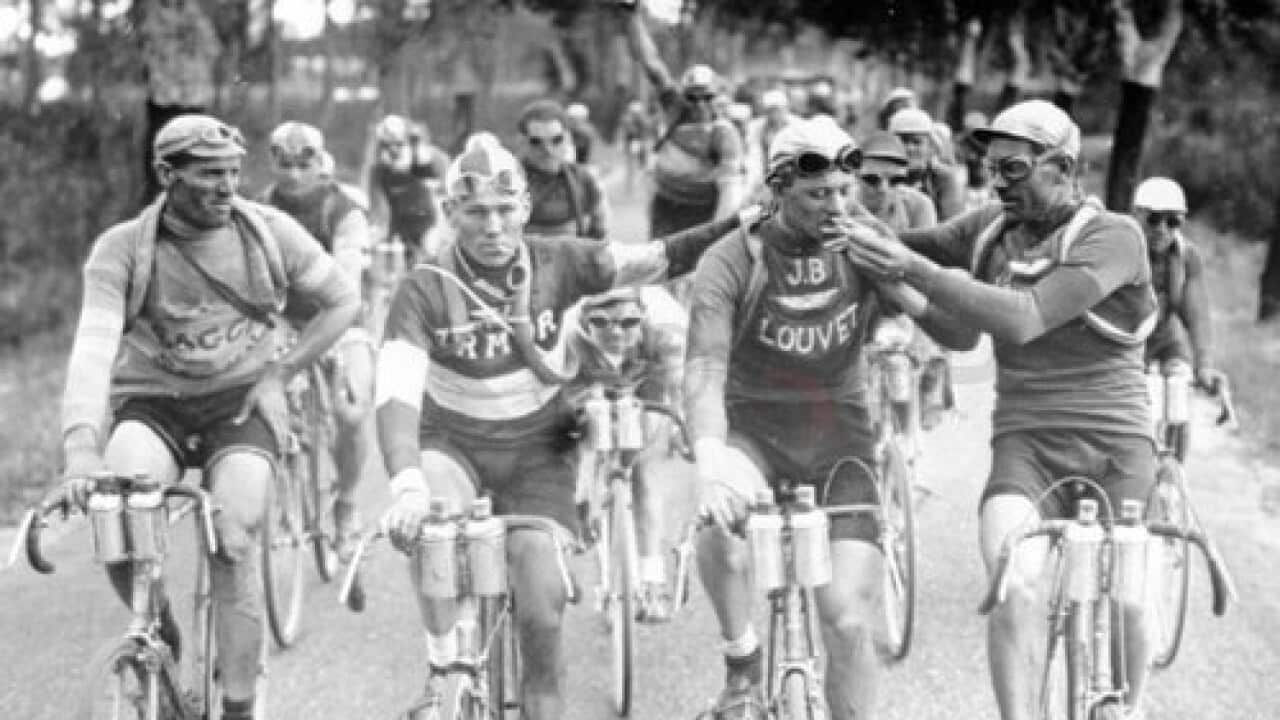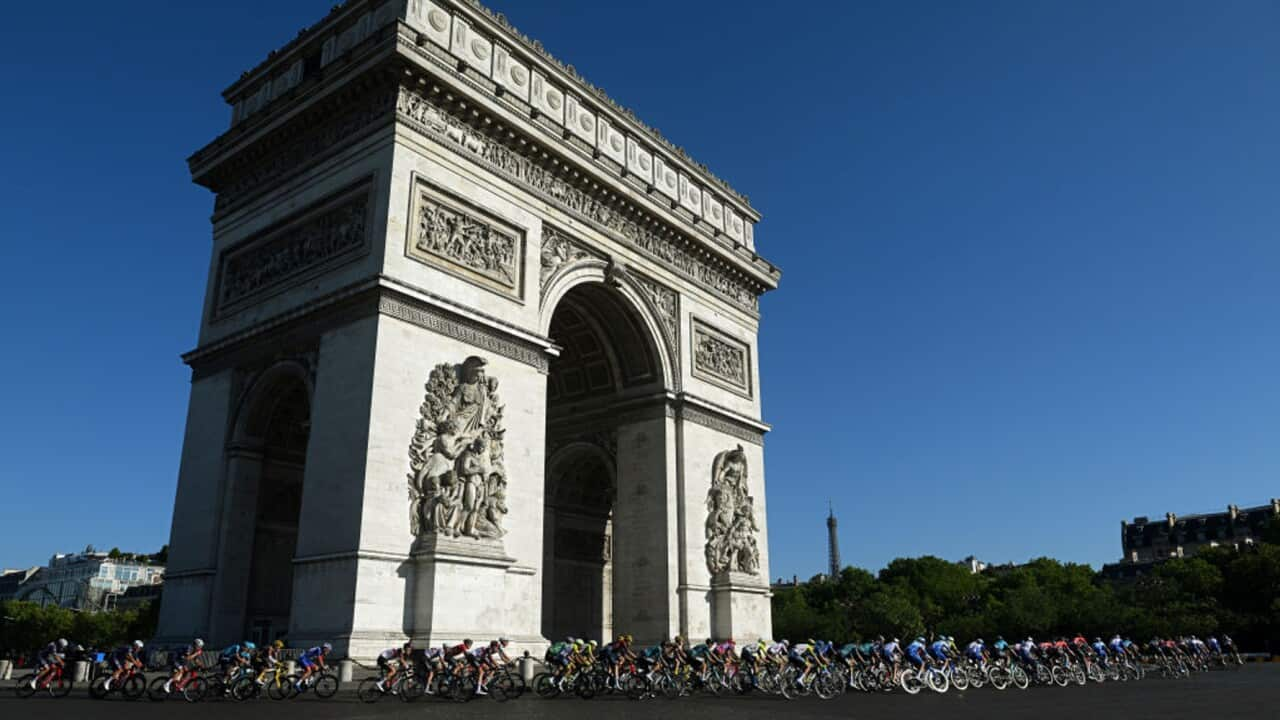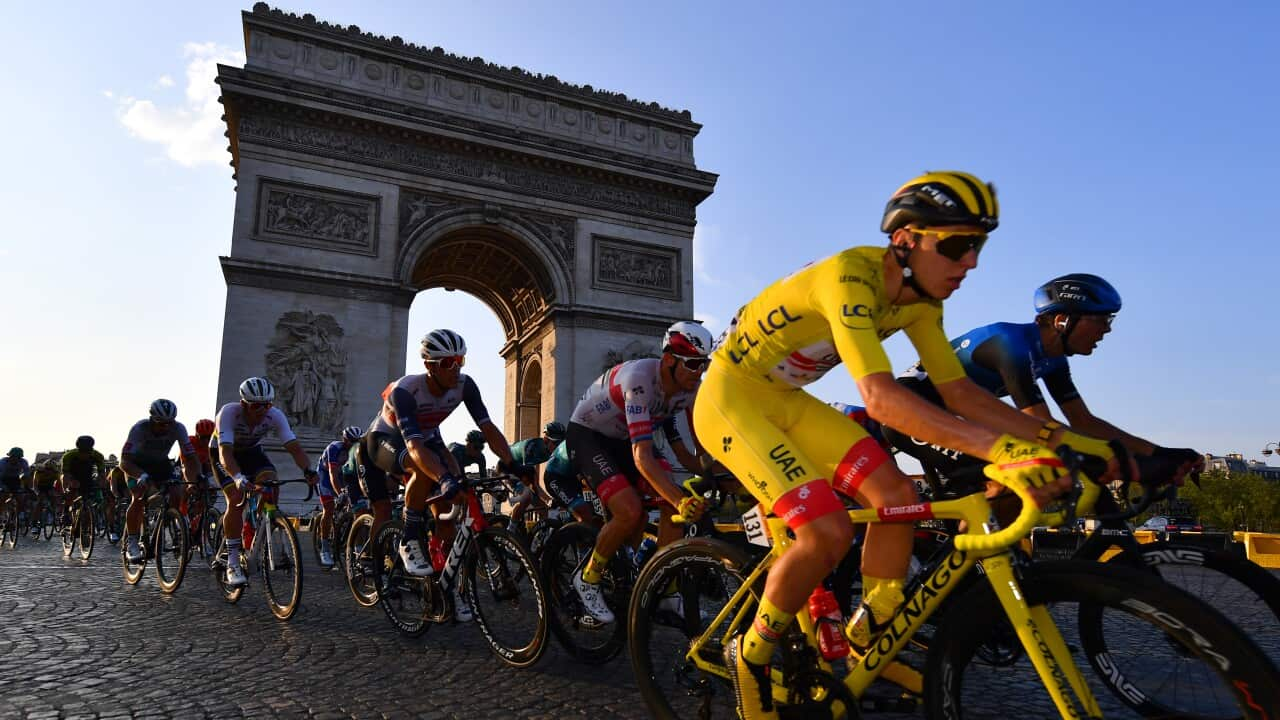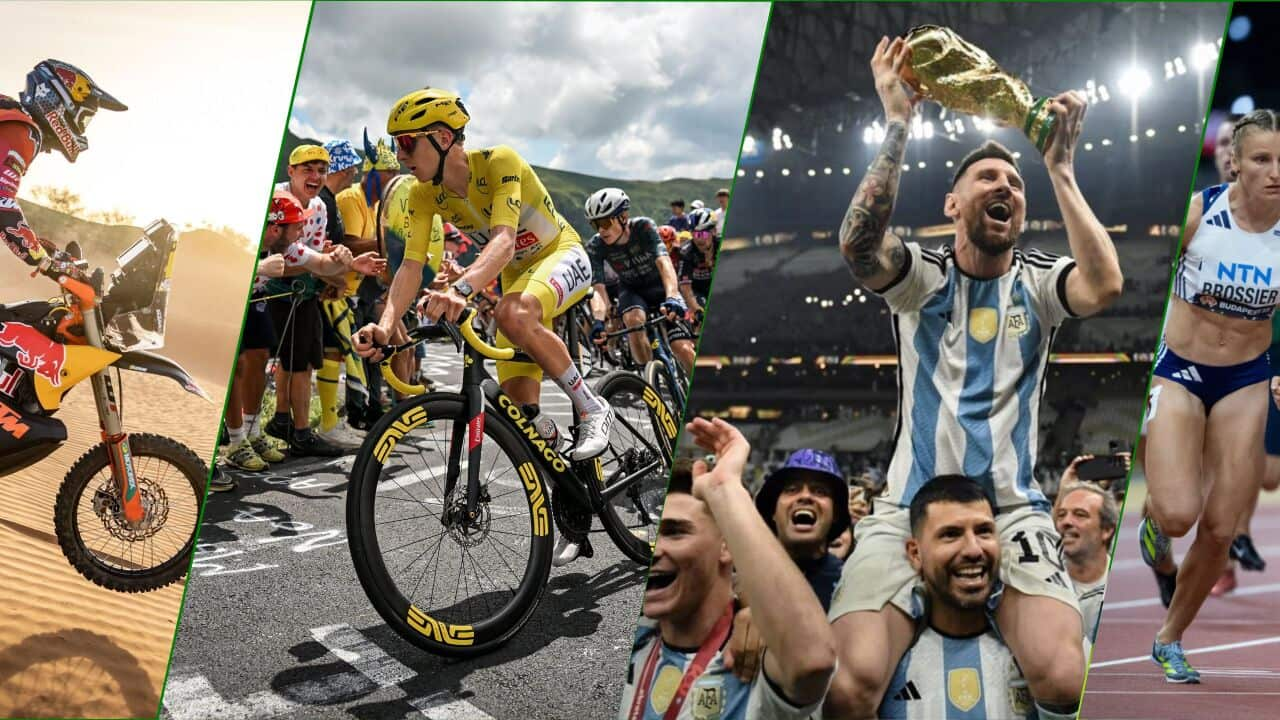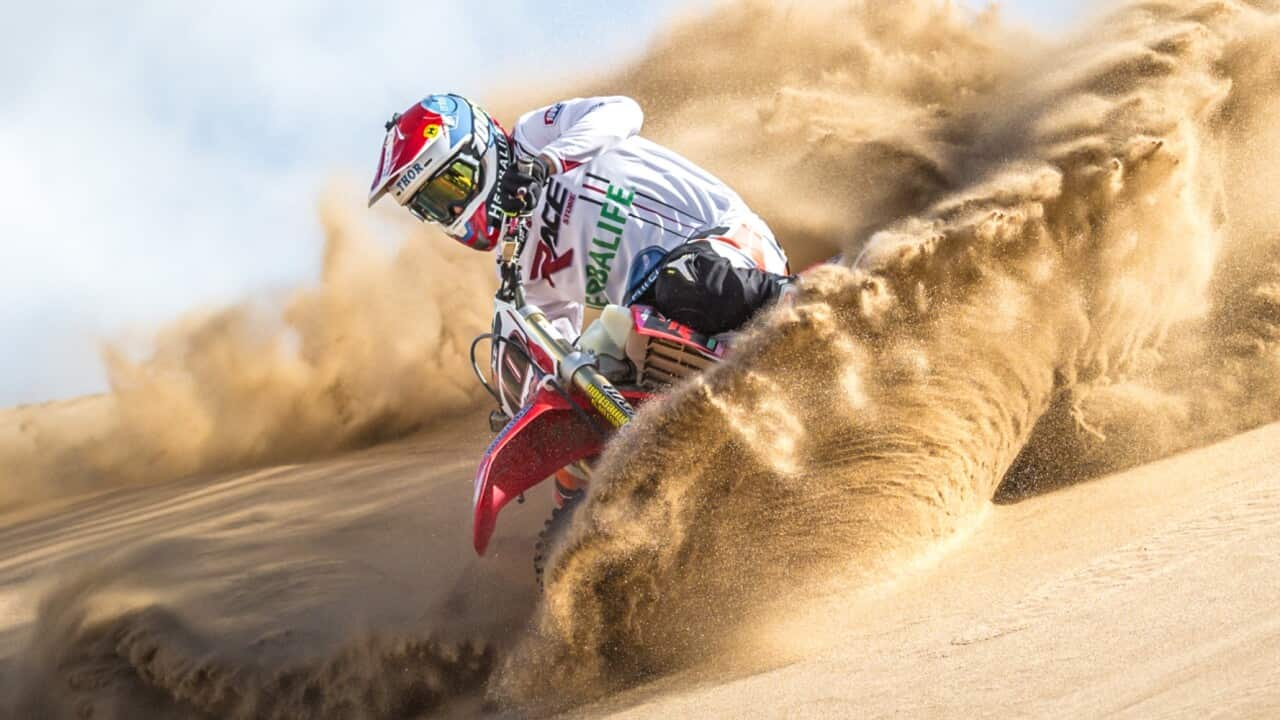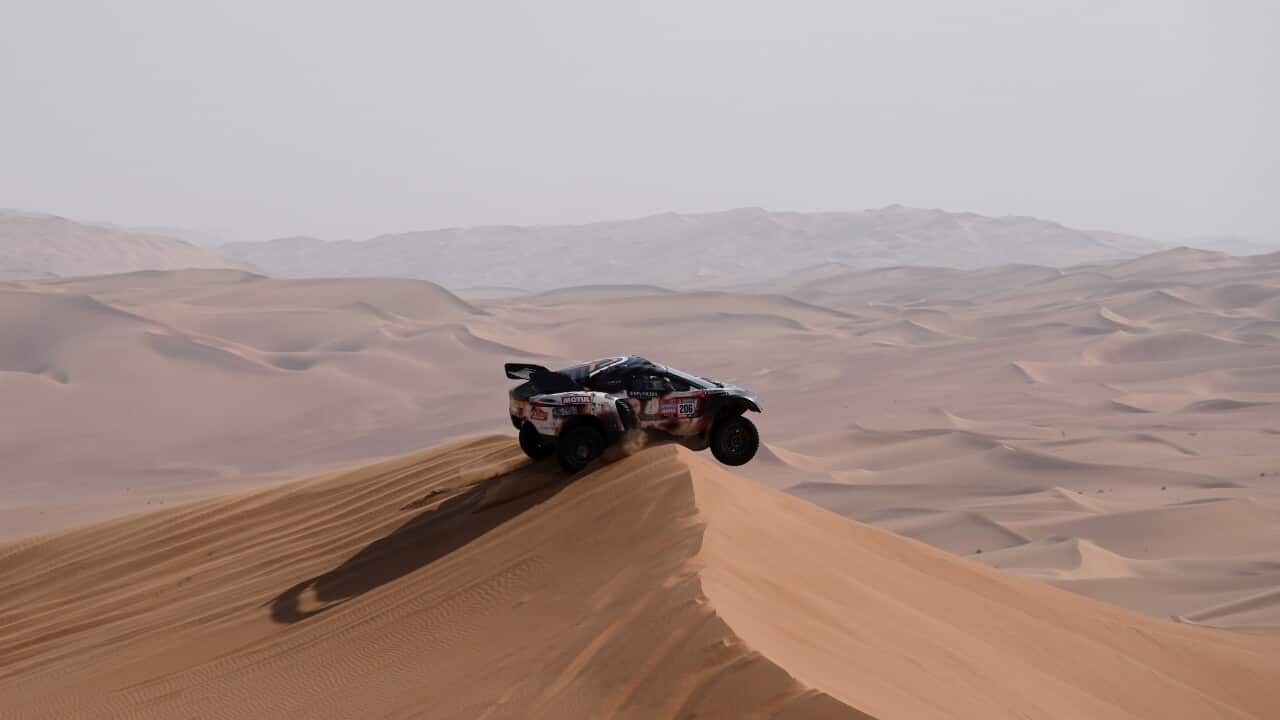It's the biggest race of the cycling season and the only place to watch the Tour de France - LIVE, FREE and EXCLUSIVE - plus the second edition of the Tour de France Femmes avec Zwift, is right here on SBS from July 1-31. We'll have replays, mini stage recaps, highlights and live streaming via the Tour de France hub and the SBS Skoda Tour Tracker app.
A sporting event with no parallel, the long history of the Tour de France has seen the drama, passion and stories of thousands of cyclists over the years illuminate the roads of the French countryside as the top cyclists in the world battle for the famous yellow jersey. Here are some fun and interesting facts from the Tour de France.
1. An epic race
Competitors in the Tour de France aren’t your average professional athletes, these are some of the toughest competitors in the world. This year's edition sees riders attempt a massive amount of climbing with a total of 52,230 metres of vertical ascent during the race, the equivalent of 5.9 times up Mt Everest!
Though, of course, the Tour de France hasn’t yet headed to the Himalayas. The mountainous terrains they tackle regularly are the peaks of the Alps, Pyrenees, Massif Central, Vosges and Jura mountains. This year, the Italian Grand Depart means that they'll add in the Apennines as well!

The total vertical ascent in the 2024 Tour de France is the equivalent of 5.9 ascents of Mt Everest.
2. Eating your way around France
To fuel all that climbing and effort, you need to take in an awful lot of food! Cyclists expend between 17,000 to 29,000 KiloJoules(KJ) per stage of the race, the average recommended male adult intake is 8700 KJ. So, up to 3.5 times the average on the hardest days of racing.
It’s no surprise to see riders eating consistently while on the bike, scoffing some energy-rich food and specially made carbohydrate-packed gels to keep their glycogen levels up. In modern times, nutritionists and cooks are a key part of every team’s staff.
SBS viewers can take a more leisurely culinary tour through France than the riders with The acclaimed French-Australian chef highlights special ingredients of the region that the Tour travels through and puts his own twist on some classic recipes.
3. Sweat it out, drink it back!
Scientific studies have come out showing a massive decrease in performance when athletes sweat out 2-3 per cent of their body mass. With peak sweat rates peaking at 1.5 litres an hour at high effort in the French summer, it doesn’t take long for waterless riders to get to a point where they’re dehydrated. The science behind the Tour de France is always improving, but the effort and fluid replacement required doesn't change too much.
An estimated 37,000 water bottles will be consumed by the 176 riders during the 21 stages of the Tour, taken from team cars trailing the peloton and helpers positioned at key points along the route. Riders in teams called ‘domestiques’ (French for servant) also perform that helper role for their designated team leader, dropping back to cars to collect bottles or offering their own to their team leader if he missed an opportunity to grab one.
4. Taking teamwork to a whole new level
So, cooperation with your team is clearly pretty important but one particularly impressive selfless display has lived down the ages in the tales of the history of the Tour de France.
René Vietto was leading the 1934 race in the Pyrenees when he heard his leader, Antonin Magne, was stuck at the top of Col de Port with an unrideable bike after a wheel buckled. The problem was that Vietto was in the lead of the race, at the bottom of the descent from the Col de Port, and faced a choice of riding on to potentially win the race, or heading backwards on the course to help his team leader.

Rene Vietto waiting for support vehicles to catch up after givng his bike away while in the lead of the 1934 Tour de France Source: Twitter
There’s another amazing story about Vietto, that he had a septic toe amputated during the 1947 Tour de France rather than pull out of the race… of course this is untrue. Instead, he had a lot of penicillin administered on the rest day and had the toe amputated post-race!

Rene Vietto wins Stage 7 of the 1934 Tour de France Credit: ullstein bild Dtl./ullstein bild via Getty Images
5. The only Australian Tour de France winner
Cadel Evans may not have had the same quality of legend attached to his performances, but he was building his own epic, a story of the unlucky runner-up at the Tour de France. He was second in consecutive Tours de France in 2007 and 2008. The first was by the second smallest winning margin in Tour history, just 23 seconds behind Alberto Contador.
He was getting older as well, and many thought the younger generation of Grand Tour stars had passed Evans and he was unable to get back to his best after several injury-plagued Tours. The 34-year-old didn’t know when to quit though and his performance at the 2011 Tour de France captivated Australians as they watched the first Aussie win in the legendary race since it started in 1903.

Cadel Evans on the Champs-Élysées (Supplied) Source: Supplied
6. Margin of victory
Some of the fun historical facts of the Tour de France don't change, like the fact that the largest time gap between first and second at the Tour de France was at the first Tour de France, and doesn't look like being beaten. T
he amount of time to complete a Tour de France in recent years is between 80 and 90 hours - at average speeds of over 41 km/hr. So you’d think the winner would take victory by maybe an hour? 10 minutes in a closer year?
Certainly in the first year of the Tour, 1903, on unpaved roads, riders carrying their own equipment and days of racing getting up to 471 kilometres in length that was the case. That first race was won by Maurice Garin by two hours, 59 minutes and 21 seconds, a record that doesn’t look like being bested anytime soon.

The first Tour de France winner, Maurice Garin (C), posing after winning Paris-Roubaix. Source: Getty
The tightest margin of victory was Greg Lemond's dramatic, come-from-behind performance at the 1989 Tour de France, where he turned around a 50-second deficit on the final time trial to win by just eight seconds.
7. Controversy
“The Tour de France has finished and I fear that this second edition of the event has also been the last.” - Henri Desgrange, Tour de France founder.
Made in the wake of a scandal-infested 1904 Tour, it has turned out to be one of the least founded fears in the history of sport, as the Tour de France attracts as much interest from mainstream media for the moments outside the norm that embrace the at times farcical nature of the sport. Cheats, misadventures, dramatic crashes and all the stories that accompany a travelling sporting circus around a loop of France have stoked the fires of public fascination.
The 1904 Tour was coming to a head when young Henri Cornet had his food spiked by sleeping pills ahead of a key stage. Cornet crashed heavily the next day and appeared out of the running for the win. He battled his way to fourth by the finish but found himself elevated to the win after the top three competitors - including 1903 winner Maurice Garin - were found to have taken a train during the race. All three were disqualified and Henri Cornet at just 19 remains the youngest-ever winner of the Tour de France.
8. Performance-enhancing drugs
Drugs in the early days of the Tour de France were mostly painkillers, used to make the marathon days in the saddle easier. Alcohol, ether and strychnine (rat poison) were in use commonly through to 1965, when a banned substance list was introduced to the sport. Even cigarettes in the early days were smoked prior to big climbs, the feeling being that they opened up the lungs.
Post the banned substances list, doping has gone underground, the dark science of sport. Scandals such as the Festina affair at the 1998 Tour de France, Floyd Llandis’ drug-fuelled 2006 Tour win and the drama after Lance Armstrong’s seven Tour de France titles being stripped when his doping history became public have rocked the cycling world.
Cycling is now the most stringently policed sport for doping; out-of-competition testing, unannounced visits, intelligence operations that have uncovered doping rings and a biological passport that monitors athletes for unusual fluctuations in biological levels all play their part in changing the efficacy of cheating to win. Cycling’s culture has changed as well, many more riders are prepared to speak out about cheating within the ranks of the peloton.

Riders smoked to 'open up the lungs' ahead of key climbs Credit: https://www.reddit.com/domain/i.imgur.com/
9. Started as a way to sell newspapers
That the Tour wasn’t begun with the idea of testing the peak of physical achievement is an odd thought, but the race began as a way to prop up the falling circulation of L’Equipe forerunner, L’Auto. It was having its sales threatened by rival publication Le Velo and thought a grand cycling race, with the results and stories covered exclusively in the paper, would give it the edge in the cutthroat world of news.
So it proved, and the Tour de France has grown into the worldwide phenomenon it is today, with the race broadcast to 190 nations each year.

It all started to help a newspaper make its mark. Credit: ASO
10. What's next for the list at the 111th edition of the Tour de France in 2024?
The history books aren’t yet closed on the Tour de France with pages still to be written in a likely continuation of the mix of celebration of physical achievement, drama and controversy that has seen ‘Le Tour’ become a mainstay of many sporting fans’ yearly schedule. The 3,492km 2024 edition of the Tour de France shapes as one where the next generation of cycling is set to confirm its hold on the sport.
25-year-old Slovenian rider Tadej Pogačar is taking title after title in his quest for a near perfect cycling season. He will have a number of key rivals for the crown, with defending champion Jonas Vingegaard, and other Grand Tour winners Primoz Roglic, Remco Evenepoel and Western Australia's Jai Hindley all present hoping to best the favourite.
Hindley won the 2022 Giro d'Italia which is similar to the Tour in length, total elevation and the mental and physical stamina required to finish at the top of the podium in Paris. This will be Hindley's second time riding in the Tour de France, after a promising debut in 2023 where he won a stage and wore the yellow jersey as the race leader for a day.
SBS is the official broadcaster of the Tour de France and the Tour de France Femmes with LIVE, FREE and EXCLUSIVE coverage of TDF 2024 from June 29 - July 21 for the men's race, and from August 12 to 19 for the women's event.
